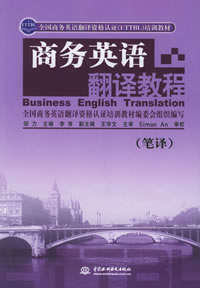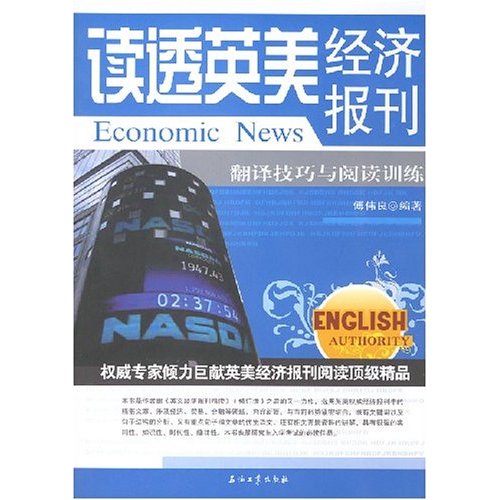专业术语翻译的综合方法:第一部分 An Integrated Approach to the Translation of Special Terms (I)
作者:古龙 2009-07-04




语际翻译公司 转载请注明https://www.scientrans.com
∗本栏目部分文章内容来自互联网,部分已经过本站编辑和整理,如有版权事宜请联系Email/MSN jesczhao@hotmail.com
The translation of special terms is an unavoidable problem. This paper attempts to propose an integrated approach to solve the problem. On the basis of some basic knowledge about terminology, a translator should search the corpora of the source language and target language to find the usage of the term and its possible translation in its own linguistic context. Then, only after the consideration of the specific domain can a linguistic choice be made on the translation of the term. In explaining this integrated approach, we use the Chinese semi-term "lüse shipin" (green food) as an example, and propose several tentative translations of this term.
1. Introduction Special terms are the linguistic expressions in various disciplines, and they generally correspond to a single concept in the given discipline. Thus, they play an important role in the construction and development of disciplines. Since the 1980s, scholars in China have translated and compiled some introductory books on terminology (Roudeau, 1985; Dubuc, 1990; Feng, 1997); there is even a call for the establishment of a course on terminology in tertiary institutions (Zheng, 2003/2005). All this has shown the importance of terminology. The China National Committee for Natural Scientific Terms was founded in 1985, and in 1996 its name was changed to China National Committee for Terms in Sciences and Technologies, CNCTST. The committee is responsible for the standardization of terms used in various disciplines. After discussions on the nomenclature of scientific and technological concepts, the committee published their agreed linguistic expressions, i.e. terminology in special fields. On the other hand, Chinese terminologists and institutions have established relations with the International Standardization Organization (ISO) and other institutes on terminological research to coordinate certain terms and promote scientific and technological exchange. Compared with general translation, the translation of terms has its own features. As is known, Chinese terms and their translations that have been approved by the CNCTST can be directly used by the translator, but on those occasions when no authority has stipulated the standard translations for terms, translating these Chinese terms into foreign languages is not an easy task. In other words, "... translators have to work as terminologists when they are faced with decisions concerning the right choice among alternative expression forms or the creation of a neologism or a paraphrase"(Sager, 2004: 252). Thus, qualified translators/terminologists must acquire some basic knowledge about terminology. Furthermore, since a term's meaning is fixed in a specified field, translators must consider the referent of the term in the Chinese context on the one hand, while on the other hand, they should let target text (TT) readers pay attention to and accept the singular meaning of the term. For those "pioneering" translators, that is, those who translate the term without any authoritative reference, their trial must include the consideration of various aspects of the translation of terms. Only in this way can their translation of certain term provide an accurate concept for the TT readers. This article focuses on the methodology of translating Chinese terms. Taking the English translation of "lüse shipin", a semi-term1, as an example, we will first discuss the basic terminological knowledge necessary for translators when translating a term and show the mismatch between existing translations of lüse shipin and its referent in Chinese context. Then a corpus-based investigation is carried out to find the usage of the semi-term lüse shipin and a similar concept youji shipin (organic food) in Chinese as well as the expressions green food and organic food in English, which would provide insight into the decision-making process of translators. On the basis of the above analyses, some tentative translations of lüse shipin are given in the hope that this integrated approach in translating terms can be adopted by more translators. 2. A terminological perspective on the translation of terms a) Basic knowledge of terminology for translators First, the formation of terms is different from that of ordinary words. For ordinary words, the meaning is to be defined from an existing form, while terms require the form (nomenclature) to be found for the known referent. This is made obvious by the research methodology adopted by terminologists and lexicologists. The former "start from the concept (referent) to think about the name of the specified co
- 评论
- seme:文章内容文章内容文章内容文章内容文章内容文章内容文章内容文章内容文章内容 章内容文章内容文章内容文章内容文章内容
- seme:文章内容文章内容文章内容文章内容文章内容文章内容文章内容文章内容文章内容 章内容文章内容文章内容文章内容文章内容

- 科技术语翻译技巧
2009-6-6 23:59:54 - 随着社会的进步和科技的发展,新的发明创造不断涌现,随之也就出现了描述这些事物的新术语。在科技英语翻译中,我们常常碰到如何把这类术语译成适当的汉语的问题。通常,有以下约定俗成的...
- 专业术语翻译的综合方法:第二部分 An In…
2009-6-10 12:49:34 - If a producer wishes to have his products certified as organic food, they must conform t...
- 第四届IEEE生物信息与生…
2009-6-30 19:42:01 - 基本信息 主办单位: 四川大学,IEEE生物医学工程协会(EMBS) 承办单位 开始日期 2010/06/18 结束日期 截稿日期 2009/1...
- 第九届全国光电技术学术…
2009-6-30 19:35:58 - 基本信息主办单位: 中国宇航学会光电技术专业委员会承办单位 开始日期 2009/11/01结束日期 截稿日期 2009...
















